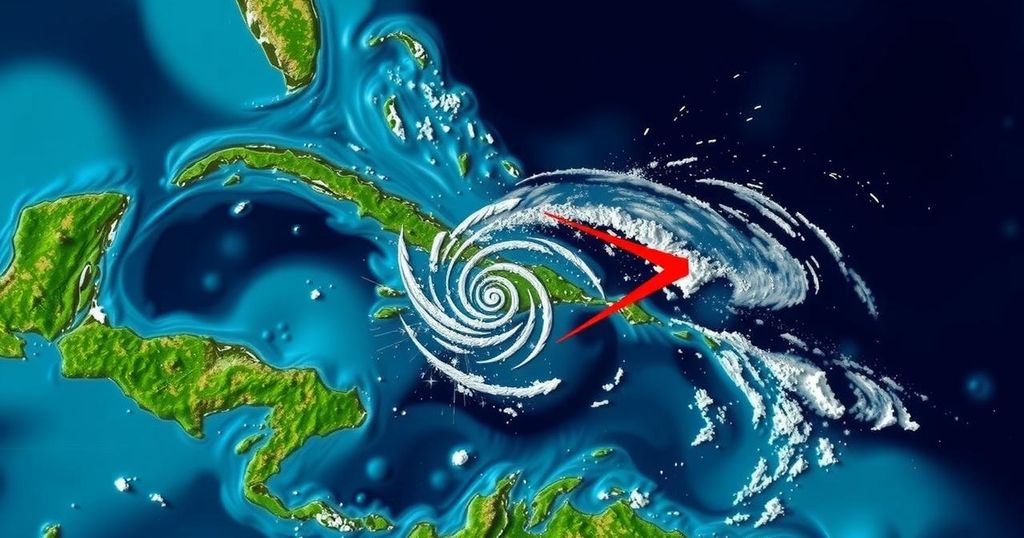Tropical Storm Oscar Approaches the Bahamas Following Impact on Cuba

Tropical Storm Oscar is heading towards the Bahamas after making landfall in Cuba, where it caused at least six fatalities and significant rainfall. Oscar is noted for being the smallest recorded hurricane, surprising forecasters who did not predict its rapid strengthening. As the 15th named storm of the Atlantic hurricane season, Oscar’s impact coincides with a broader warning of an above-average season. Meanwhile, Tropical Storm Kristy is forming in the Pacific.
Tropical Storm Oscar continued its trajectory toward the Bahamas on Tuesday following its landfall in Cuba as a Category 1 hurricane, resulting in the unfortunate deaths of at least six individuals. The storm caused significant rainfall, compounding the already critical power outage experienced across Cuba. As of Tuesday morning, Oscar was situated approximately 45 miles (75 kilometers) south-southeast of Long Island, Bahamas, exhibiting winds of 40 mph (65 kph) and moving north-northeast at 12 mph (19 kph), as reported by the National Hurricane Center in Miami.
The hurricane center remarked that “Oscar is at best barely a tropical storm at this time.”
Forecasters predict that Oscar may deliver up to 5 inches (13 centimeters) of rainfall throughout the southeastern Bahamas, with isolated locations potentially experiencing up to 8 inches (20 centimeters). A tropical storm warning has been issued for the central and southeastern areas of the Bahamas.
Oscar earned the distinction of being the smallest recorded hurricane, characterized by a wind field measuring approximately 6 miles (10 kilometers) in diameter, which took many experts by surprise when it made landfall on Grand Inagua Island in the Bahamas on Saturday and again late Sunday in eastern Cuba. Michael Lowry, a hurricane specialist, pointed out the inadequacy in forecasting, stating, “It’s not often we see a colossal failure in hurricane forecasting.” He observed that none of the predictive models anticipated Oscar’s strengthening into hurricane status.
In Cuba, Oscar dropped over 15 inches (38 centimeters) of rain in certain eastern regions on Monday, prompting warnings about substantial flooding and the potential for landslides. The deaths reported in Guantánamo occurred amidst Cuba’s ongoing recovery from a major blackout, which had ignited small protests alongside stern government communications emphasizing that disorder will not be tolerated.
Oscar marks the 15th named storm and the 10th hurricane of the Atlantic hurricane season, which spans from June 1 to November 30. The National Oceanic and Atmospheric Administration had predicted an above-average hurricane season for this year, forecasting 17 to 25 named storms, including four to seven major hurricanes of Category 3 or higher.
Meanwhile, Tropical Storm Kristy was observed over open waters in the Pacific Ocean, located 375 miles (605 kilometers) west-southwest of Acapulco, Mexico, with maximum sustained winds of 50 mph (85 kph) and a west-northwest movement at 15 mph (24 kph). Kristy is expected to develop into a hurricane by Tuesday evening.
The article presents an update on Tropical Storm Oscar, which transitioned into a hurricane before impacting Cuba and subsequently the Bahamas. It highlights the storm’s severity and its implications for the regions affected, particularly with Cuba grappling with a significant power crisis. The hurricane season’s context, characterized by an above-average forecast by the NOAA, provides insight into the underlying environmental conditions contributing to storm development and intensity. Furthermore, juxtaposed with Oscar, Tropical Storm Kristy appears to be forming in the Pacific, indicating a concurrent active hurricane season in both the Atlantic and Pacific regions. The attention to forecasting challenges underscores the unpredictability of such weather events, as cited by experts in the field.
In summary, Tropical Storm Oscar, now affecting the Bahamas after devastating Cuba, serves as a stark reminder of the unpredictable nature of hurricanes. The storm not only resulted in loss of life and significant rainfall but also compounded the challenges faced by a nation recovering from extensive power outages. As the 2023 hurricane season progresses, with forecasters predicting more storms, the importance of accurate weather prediction becomes increasingly evident. The situation underscores the need for continual monitoring and preparedness in the face of such unpredictable natural phenomena.
Original Source: www.washingtontimes.com







